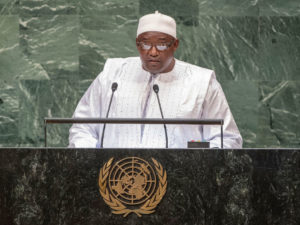
Amid complex global multilateral challenges, Adama Barrow, President of the Gambia, told the United Nations Assembly on Tuesday that “no country can thrive or solve all its challenges in isolation.”
“Our salvation, as human beings, lies in strengthening our multilateral institutions and fostering greater international cooperation to collectively address global challenges,” he said, noting that the UN “uniquely provides the opportunity to achieve this goal.”
He observed that during this time of multiple global challenges, the UN’s work is being undermined through inadequate funding.
“Those of us who value the UN, as well as those who have benefitted immensely from its work, should be at the forefront to call upon all Member States to step up support for the Organization,” he exhorted.
Underscoring the UN’s lead role in solving global challenges, Mr. Barrow said it is “our task is to ensure [the UN] has the required capacity, influence and effectiveness.”
He stressed that decisions and actions rooted in a rules-based international system, which is underpinned by multilateral agreements, form the basis of successful relations between and among nations – from tackling climate change and terrorism to addressing disarmament, trade, development and other concerns.
“As leaders, we have the shared responsibility to promote a world order that prioritizes peace over insecurity; a world order that eliminates the growing inequalities around the world; and a world order that brings us sustainable development,” he added.
Reflecting on the Gambia, Mr. Barrow flagged the country’s new comprehensive National Development Plan (2018-2021), which employs key priorities, such as infrastructural development, agricultural transformation, macroeconomic stability, job creation and employment as a means for the country to oversee its own destiny.
“The Plan also seeks to consolidate our democratic gains through good governance, rule of law and respect for human and people s rights,” he explained.
In pursuing of a fully-transformed Gambia, the President recognized the importance of engaging with The Gambian Diaspora, which he referred to as “The Eighth Region of The Gambia.”
“Our Diaspora strategy seeks to explore and utilize the skills, talent and resources of Gambians everywhere for the successful implementation of the National Development Plan,” he stated.
He also urged for incentives to curb youth migration, hoping that the adoption of the new Global Compact on Safe, Orderly and Regular Migration in December would offer better educational and job opportunities.
As a part of the Sahel region, he expressed optimism for the new UN Support Plan for the Sahel in addressing the challenges of development in there as well as fostering peace, security and cross-border relations.
“We envisage that this strategy will yield important dividends for Africa, especially towards the maintenance of peace and security and the elimination of terrorism in the region,” the President said.
He commended Ethiopia and Eritrea for their efforts to bring peace to the Horn of Africa, saying: “They have set an example for the rest of the continent to emulate.”
Source: UN News


Comments are closed.